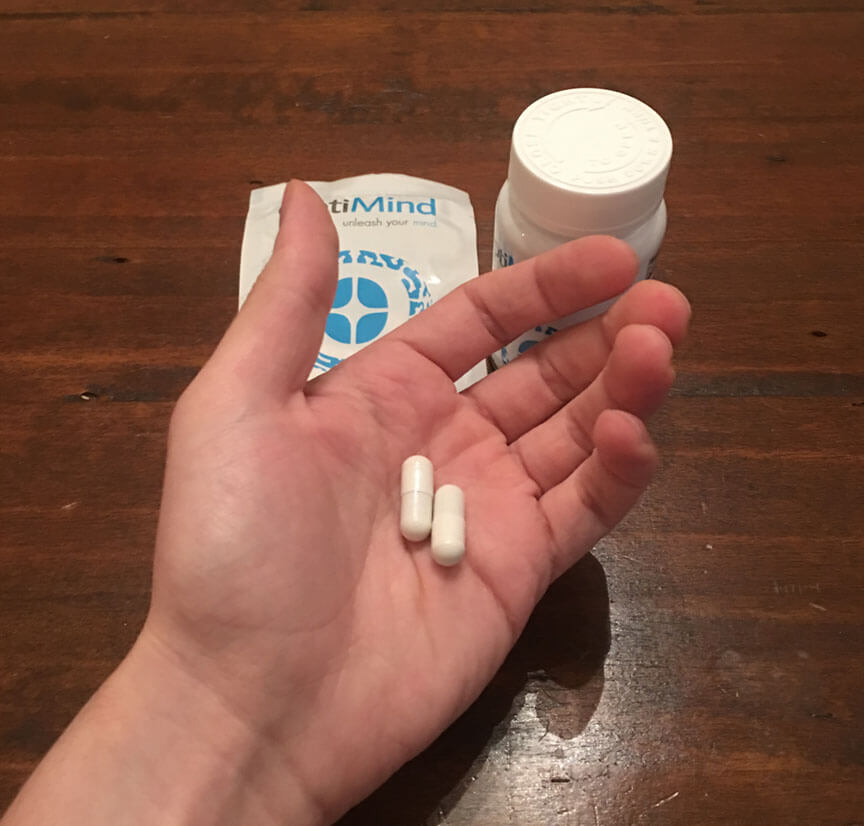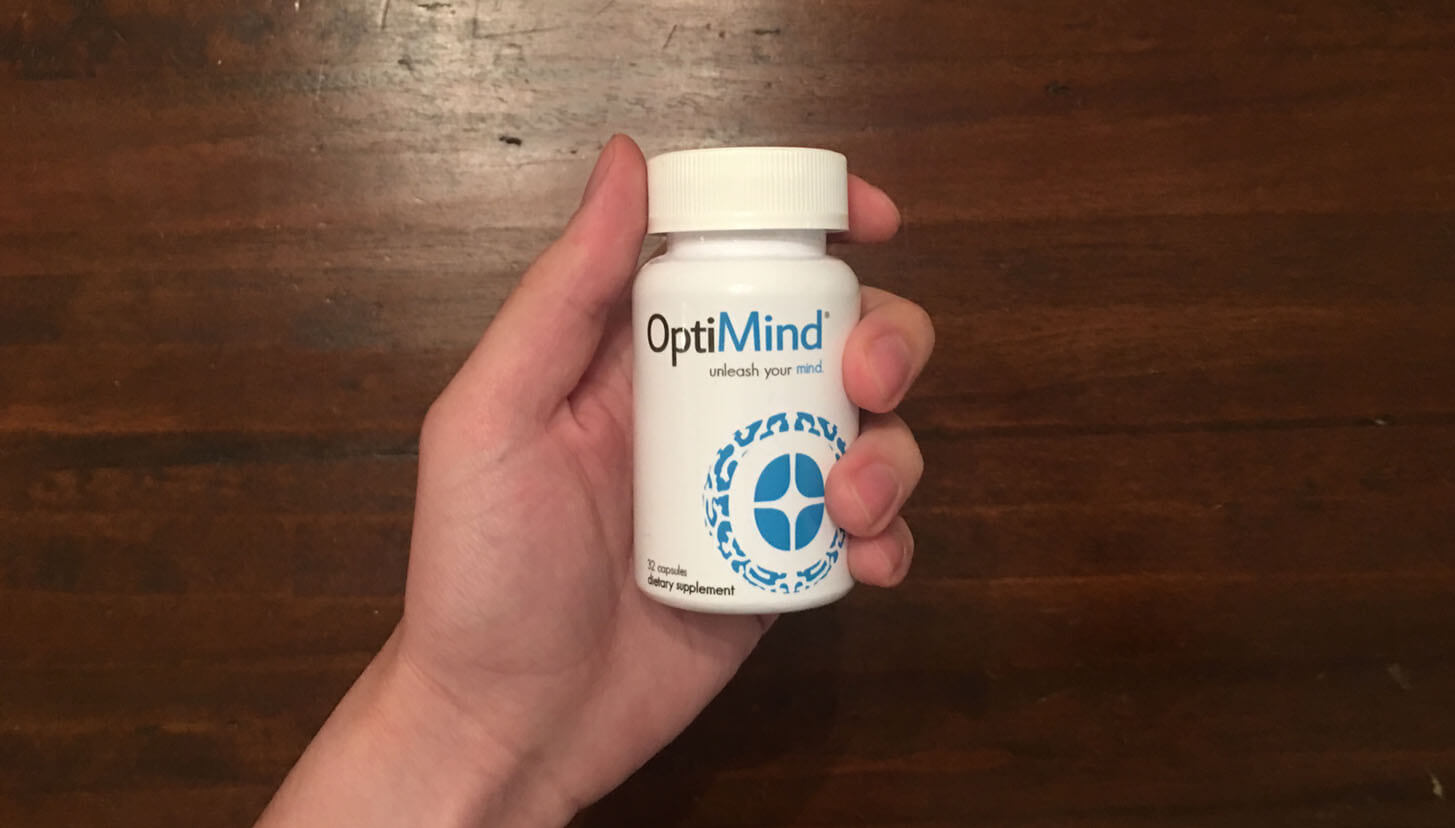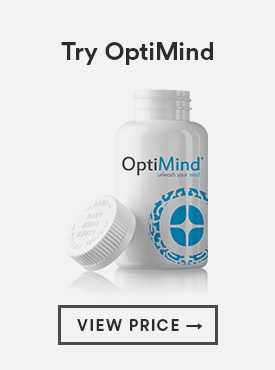I first reviewed OptiMind in 2016. Since then, the ingredients haven’t changed but the public interest has… It’s grown become one of the most popular nootropics on the market.
In my initial review, I tested OptiMind for a full month (30 days). I do this to get an in-depth and personal account of what each nootropic is like in my daily routine. While I believe 30 days is enough to initially test the effects of a nootropic, I often like to expand my review by testing it even further.
Because I’m a fan of OptiMind and I tend to reach for it in certain cases when I need an extra “brain boost”, I decided to take OptiMind for 90 full days and record the results.
Here’s what I found…
OptiMind 90 Days Later — Pros

The recommended dosage is 2 capsules
A big weakness of mine is being able to wake my brain up in the morning. It’s why I’ve relied so heavily on caffeine in the past (which has been both a blessing and a curse). Many nootropics that I’ve tried over the years didn’t have the ability to give me the morning boost I needed to really get myself going in the morning. Why? They lacked caffeine.
I have a love/hate relationship with caffeine. It is arguably one of the most popular drugs on the planet but it has a lot of drawbacks, such as crashing mid-day and building up a tolerance. I try my best to keep my caffeine consumption at a minimum and counter the negative effects with nootropics such as L-Theanine, which helps to ease the “crash” that caffeine has on many people.
Fun fact: the L-Theanine in tea is the reason why tea drinkers don’t usually crash as bad as coffee drinkers.
The reason I’m going on a caffeine rant is because OptiMind is one of the few nootropics I really enjoy using that has caffeine in it. That caffeine is mixed with a variety of other ingredients to make it a powerful way for me to wake up in the morning.
Since I had OptiMind to kick me into gear in the morning, I was less likely to mope around in the morning, slowly waking myself up and much more likely to begin working. By month two I had already seen a noticeable uptick in the amount of work I was outputting in the morning and my efficiency.
As I mentioned in my initial review, I found myself in an energy/focus flow state through most of the day. This was incredibly helpful in zipping through work. There were a lot of days I found myself at the end of my to do list mid-afternoon.
One added (and surprising) benefit that OptiMind had was on my fitness ability. Since I was able to wake up a lot easier while taking OptiMind, I began to wake up earlier. This eventually led me to move my schedule around so that I could workout or run in the morning, rather than in the evening. My initial concern was that I was going to be exhausted after my workout and not be able to work as effectively during the day, even after taking OptiMind. However, that wasn’t the case at all. In fact, working out in the morning after taking OptiMind was one of the best things I could have done. The combination of OptiMind plus endorphins and adrenaline from my workouts put me in a heightened mental state for nearly the whole day. My brain felt like it was firing on all cylinders.
OptiMind 90 Days Later — Cons
While I’d love to say that OptiMind is the next “Limitless Pill” and everything was fine and dandy for me while taking it, that wasn’t the case. There were some minor negatives I experienced but nothing that really surprised me.
First, I made the mistake of taking OptiMind on an empty stomach one day upon waking up. I usually always take any supplement with food but it slipped my mind this time. As someone who has a sensitive stomach, this was an issue for me. I’m not sure if it was the caffeine or one of the other ingredients but I had a bad stomach ache for about an hour. I remember getting the same stomach ache when taking multivitamins on an empty stomach.
Second, near day 75 I started to notice myself getting more irritable during the evening. This was most likely the effect of me crashing from the constant caffeine in my system. The crash wasn’t as bad for me as it would have been from drinking a lot of coffee or an energy drink but I still felt it.
Lastly, I did start to see the effects wear off after the first month. I don’t think it’s possible to take any supplement for a full 90 days without building up some sort of tolerance to it. Because I began building up a tolerance there were days near the end of the 90 days where I felt like I needed to take more than the recommended dose.
Final Thoughts: Is OptiMind Still One Of My Favorites?
Assessing the pros and cons over this longer review, I would still say that OptiMind is one of my favorite nootropic blends. In terms of ingredients, it has some of my favorites — Bacopa Monnieri, Vinpocetine, Huperzine A, and of course caffeine.
Moving forward, if I were to take OptiMind for extended periods of time again, I would do a few things differently…
- Drink a lot of water: I would often get so “in the zone” that I would forget to stay hydrated. This ended up making me crash a lot quicker and harder near the end of the day. When I would drink water regularly, I didn’t crash as hard.
- Remember to eat healthy: I found that OptiMind curbs my appetite. While this might be great for someone who is looking to lose weight, I found that not eating led to late-day periods of brain fog and lethargy. Of course, when I ate (and ate healthy) I was able to regain my focus.
- Get in a good workout: There are no miracle pills or supplements. Your body needs a good combination of exercise, healthy foods, and sleep to function properly. If you’re getting all of those things, a nootropic will be able to really help.
- Don’t skip on sleep: A big problem I had when using OptiMind for an extended period of time was that I started to rely on it in the morning. This meant I would work late, get up early, and rely on OptiMind to get my through the day. This might be okay once or twice but not regularly. I ended up messing up my sleep schedule big time during the second month. Of course, this was my own fault and not really OptiMind’s. Again, your body needs a good combination of exercise, healthy foods, and sleep to function properly.
Overall I am happy I was able to perform this extended review. It shed a light on the pros and cons of this OptiMind as well as gave me a better insight into my own work habits (and what I could improve upon).
If you have a question about OptiMind, feel free to leave a comment below and I’ll respond as quickly as possible!




I have had similar effects with caffeine too late in the day. If adequate protein(one solid portion per day)and vegetables are consumed, then 1-2 servings(nothing past 3pm), of Optimind per day (early) is a good balance. Bright minds can also rest.
Thanks for the tip!